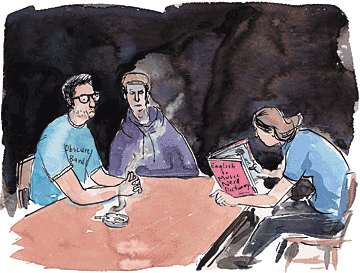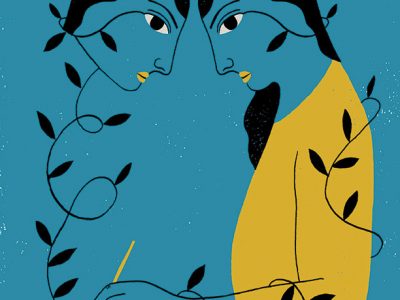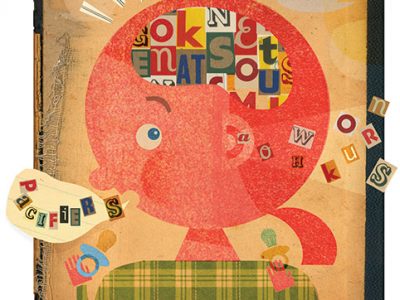
Compared to parsing pop culture, linguistics is a snap.
By Katie Haegele
At Penn, I took up the kind of major that made even the most bookish types say, “What are you gonna do with that?” I started out figuring I’d be an English major. I’d wanted to be a writer for as long as I could remember, and my academic experience to date had dictated that English was what I was best at. English everything: grammar, literature, even penmanship. The other subjects I had less enthusiasm for. I’d flailed around in math classes my whole life, trying to make sense of things I simply didn’t have the imagination for. “What do you mean, the number goes into another number?” I remember demanding of my dad about five minutes before I sent the textbook sailing across the kitchen.
No, I didn’t seem to be built for anything but English. But the English courses I enrolled in my freshman year took a backseat to one I selected by accident. Linguistics 106, the course book informed me, to my great delight, would fulfill the same requirement as calculus.
In our first class the TA told us to think of the subject as the architecture of language, but it turned out to be more like “word math,” as one classmate put it. Somehow I loved it anyway. It was thrilling to peek under the hood of the way we communicate with each other to see the mechanics of it all. It was different from any sort of mental exercise I’d ever encountered. Plus, I felt a certain kinship with the TA, who was slight and funny and hot-headed and easily flustered. She was me in 10 years. I was sold.
So I passed over literature of the English language in order to study the words themselves: their sounds, their evolution over time, their varying usages and nuances of meaning, the way they reflect social significance. As I soon discovered, there was a whole universe to be found in every single one, like William Blake’s world in a grain of sand. Who says science isn’t art?
The grad students I took many of my classes with taught me what it meant to devote yourself completely to something you loved, simply because you loved it. Sure, there was glory to be found through publishing in a prestigious journal or delivering a well-received presentation. But really, we sat around each other’s cramped apartments discussing the incredible language diversity in Papua New Guinea because we wanted to, and it mattered little that the rest of the world had other things on its mind.
“Linguini?” my obnoxious uncle said, to his own raucous laughter, at every family gathering during the time I was in college. “My niece is studying to be a pasta chef!” During my college years, the topic of Ebonics caused a brief flare-up of general interest in my obscure field of study, but the rest of the time the few undergrad linguistics majors in my class talked among ourselves. Somewhere I’ve still got those photographs of us at graduation: one of me and Aaron while Rebecca held the camera, one of me and Rebecca while Aaron held the camera, and one of all of us while a pretty, nose-ring-wearing girl from Urban Studies did the honors. Clearly, we three knew something our other classmates didn’t.
The linguistics major taught me that there are at least 6,000 languages spoken in the modern world and that children have the innate ability to understand complex grammar. But it also served as the arena where I learned to be the most me. I’d found nothing less than true love, and my nerdiness flourished in the phonetics lab like an orchid in a hothouse.
Flip a few chapters forward, past the internships where I “paid my dues,” and past the deadly job at a trade magazine where I wrote about telemarketing. One day I answered an ad for an unpaid assistant to the book-section editor of an alternative weekly here in Philadelphia. I couldn’t believe my luck—here I was, at a newspaper where arts and entertainment reigned supreme—and I hung around that office until they offered me a proper job.
I was delighted to write about things that actually interested me, but being at the paper represented something almost as exciting: inclusion into a world of coolness I’d always felt eluded me. This was a company where managers were likely to have tattoos from wrist to elbow, and professional milestones—an especially thick issue, a new publisher—were celebrated in some dumpy bar that looked and smelled like a moldy basement. Little did I know I was actually stepping into a whole new arena of scholarship, one where everyone was constantly cramming for finals.
Now, in addition to being a writer on staff, I was also the poor sap who edited the entertainment listings. Even though that section is the most read part of the paper, it’s a truly thankless job—tedious and time-consuming, with the only feedback consisting of irate phone calls from club owners informing you that DJ Cozmic spells his name with a Z.
As gatekeeper to the entertainment calendar, I had to be familiar with hundreds of unknown local and touring music acts in order to shuffle each entry into the appropriate category. To the uninitiated, rock or R&B should be sufficiently descriptive category names. But the uninitiated are not the core readers of the A&E section of the average alternative weekly.
In big brush-strokes, those readers discriminate between indie rock, punk rock, folk rock, and so on. Perfectly reasonable. But to write about this stuff, which I was soon asked to do, one also had to know emocore, math punk, trance, alt-country, new wave, no wave, nü metal, neo-soul, synthpop, garage rock, noise-rock, psychobilly, shoegazing, progressive house, and hardcore. The list goes on, but I’ll spare you. I’d arrived on the scene thinking I was the Queen of Obscurica, but I had nothing on these people.
One boy who worked as a freelance music critic had a record collection so enormous and obsessively chronicled that his little apartment looked like he’d modeled it after a hall in the Library of Congress. Another writer was the inventor of a pub-quiz game that drew its questions from the annals of forgotten TV shows and movies from the 1980s. Even the employees of the paper who weren’t compulsive by nature—in other words, not the writers—embraced geek chic with their absent-minded-professor hair and horn-rimmed glasses.
Let it be said that I love music and believe myself to have good taste. I’d certainly encountered the smart-is-cool sensibility at the concerts and trendy art shows I attended in school. What was surprising was how seriously these people took their pop-culture studies. Why would anyone devote all that mental energy to something so ephemeral?
The reason pop culture is considered low art, my friend who lived in the Library of Congress explained patiently, is because it hasn’t withstood the test of time. Yet. A Fischerspooner song or an Ursula Rucker spoken-word performance may contain the kind of truth that will make it relevant 50, 100, 200 years from now—or it may not. Without the benefit of the passage of time, he added, it was anybody’s guess how “important” this art really was.
Fair enough. And you’d think the comprehensiveness of these endeavors—posting to fan listservs, reading music magazines of every stripe, attending shows whether you liked the band or not and then discussing them ad nauseum—would have appealed to the academic in me. But their devotion didn’t ring true, and it wasn’t long before I figured out why. They repelled me, these self-taught pedants, because they were all so ill at ease. Shouldn’t they be content to be around what they loved the way I remembered my professors and classmates to be?
It was as though their studies, exhaustive as they were, had less to do with understanding art than with creating a culture of exclusion. One inscrutable CD review made all of Noam Chomsky’s syntax theories seem accessible and inviting; at least he wanted his readers to understand him. Tired of being the odd man out in social situations, my new coworkers were putting all their brainpower toward reinventing cool. They were stamp collectors with trendy haircuts. They were nerds gone bad! Worse, they’d categorized, critiqued, and deconstructed the pulp right out of the things they loved. Read between the lines of Saussure’s perfect book on general linguistics and all you’ll find is a craving to understand what makes us tick. The whole discipline is practically an ode to humanity.
I eventually got out of editing the listings for a much better gig: I write about feminism and books and other things I care about for the same paper, and have passed the calendar baton to someone new. I now have a working knowledge of downtempo and drum’n’bass (and which is better to play at a party), but dealing with the music geeks also taught me not to be too easily impressed by “cool.” Within a popular culture where wry commentary and studied studiousness is what passes for clever, I remain a true nerd, one who thrills to an issue of the Journal of Pragmatics just as much as a new Radiohead album. And that’s fine with me.
I just hope for their sake those guys can find their linguistics.
Katie Haegele C’98 is a contributing editor for The Philadelphia Weekly and has also written for The Utne Reader and other magazines.




